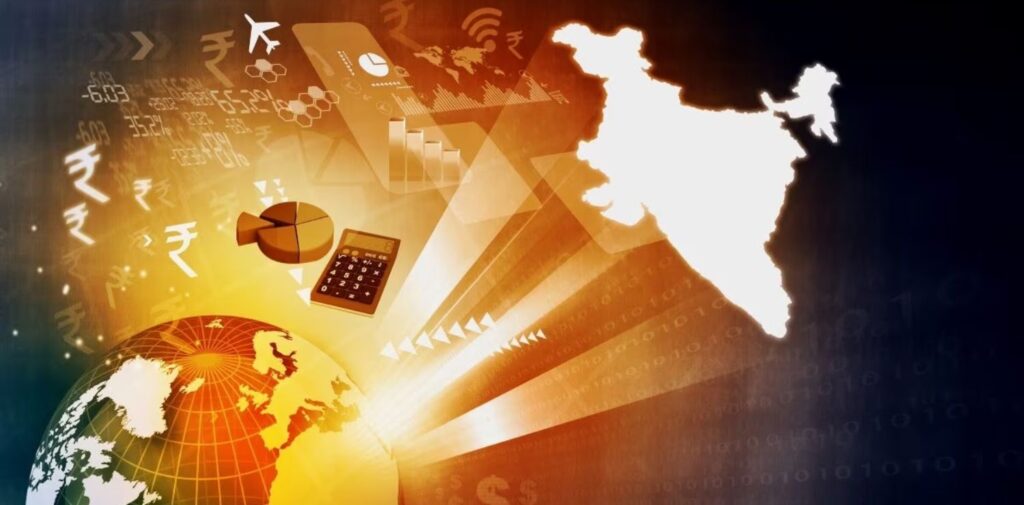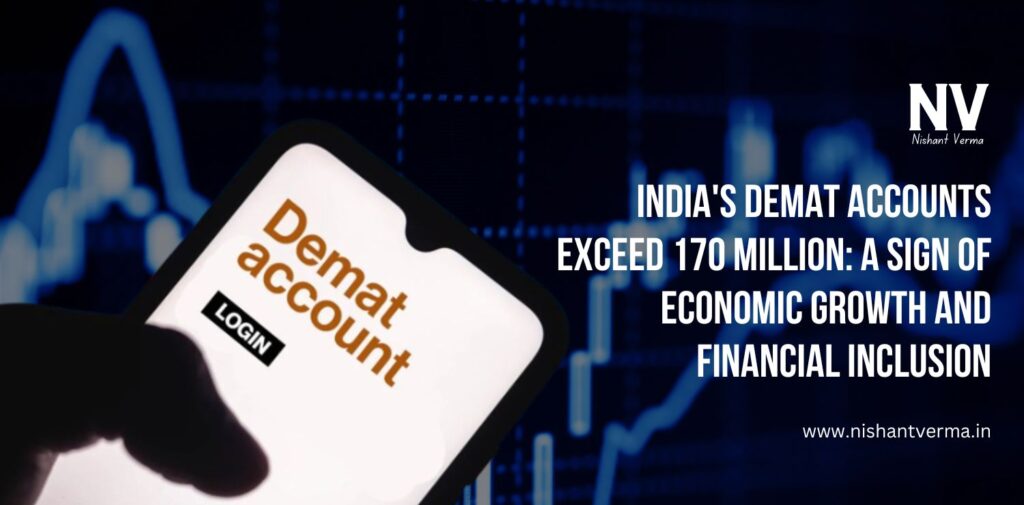In a remarkable milestone for the Indian financial sector, the number of dematerialized accounts, commonly known as demat accounts, has now crossed the 170 million mark. This figure is larger than the combined population of three major developed countries: the United Kingdom, France, and Canada. This development signifies the growing participation of Indian citizens in the financial markets, reflecting the rapid transformation of the country’s economy and the increasing financial literacy among its people. In this article, we will explore the significance of this milestone, how it relates to India’s growth story, and what it means for the future of the Indian economy.

What Are Demat Accounts?
Before diving into the details of this achievement, it is essential to understand what they are. A demat account is an electronic account used to hold and trade securities like stocks, bonds, and mutual funds in digital form. It eliminates the need for physical certificates and makes buying, selling, and transferring securities faster and more efficient. In India, demat accounts are managed by two major depositories: the National Securities Depository Limited (NSDL) and the Central Depository Services Limited (CDSL).
The Surge in Demat Accounts: A Reflection of India’s Economic Growth
The rapid increase in the number of demat accounts in India is a clear reflection of the country’s growing economy. Over the past decade, India has consistently been one of the fastest-growing economies in the world. With a burgeoning middle class, increasing disposable incomes, and improved access to financial services, more and more Indians are looking for ways to invest their money and build wealth.
This surge in demat accounts can be attributed to several factors:
Growing Financial Awareness: With the government’s push towards financial literacy, more Indians are now aware of the benefits of investing in the stock market. Various initiatives, such as campaigns by the Securities and Exchange Board of India (SEBI) and private organizations, have educated people about the importance of investing and managing wealth.
Digitalization of Financial Services: The digital revolution in India has made it easier than ever for people to open demat accounts and start trading. The advent of online trading platforms, mobile applications, and user-friendly interfaces has democratized access to the stock market, allowing even those in remote areas to participate.

Rise of Retail Investors: Traditionally, stock market investment in India was dominated by institutional investors. However, in recent years, there has been a significant rise in retail investors—individuals who invest in the stock market. The Covid-19 pandemic further accelerated this trend as people sought alternative income sources during lockdowns.
Government Reforms and Policies: The Indian government has implemented several reforms aimed at making financial markets more accessible and attractive to the common man. Policies like the Pradhan Mantri Jan Dhan Yojana (PMJDY), which aimed at providing banking facilities to the unbanked, have paved the way for increased participation in financial markets.
Attractive Market Performance: Over the past few years, the Indian stock market has performed exceptionally well, attracting a lot of attention from investors. The promise of higher returns compared to traditional saving instruments like fixed deposits has enticed more people to open demat accounts.
Demat Account Growth: A Sign of Financial Inclusion
India has long struggled with financial inclusion, with large sections of the population having limited or no access to formal banking and financial services. However, the surge in accounts is a positive sign that the country is making progress in bringing more people into the fold of formal financial markets. As of today, over 170 million Indians hold these accounts, showing that investing is no longer limited to the elite.
Financial inclusion is critical to the overall economic growth of the country
When more people are financially empowered, they can save, invest, and contribute to economic activities. The surge in demat accounts is not just about stock market participation—it indicates a broader shift towards financial inclusion, where more citizens are part of the formal economy and can benefit from various financial products and services.
The Role of Technology in Expanding Financial Access
India’s digital revolution has played a key role in the growth of demat accounts. With the widespread availability of smartphones and the internet, the financial sector has embraced technology to offer seamless, user-friendly experiences. Here’s how technology has contributed:
Online Account Opening: Gone are the days when opening a demat account was a lengthy and complicated process involving physical paperwork. Today, anyone with a smartphone and internet connection can open a demat account within minutes. The Know Your Customer (KYC) process has also been digitized, making it easier for people to authenticate their identities and start trading.
Mobile Trading Apps: The rise of mobile trading apps has given people the flexibility to invest on the go. Whether they are at home, at work, or commuting, investors can easily buy and sell securities with a few taps on their smartphones. This has made investing accessible to a much larger segment of the population.

Robo-Advisors and Automated Investment: Technology has also introduced automated investment tools like robo-advisors, which help individuals with little financial knowledge to make informed investment decisions. These platforms analyze market trends and create personalized portfolios, making stock market participation easier for beginners.
Educational Content and Market Analysis: Technology has made it easier for people to educate themselves about the stock market. Online platforms offer free tutorials, market analysis, and expert advice, empowering investors to make smarter decisions.
The Future of Demat Accounts in India: What’s Next?
With over 170 million demat accounts, India has become one of the largest retail investor markets in the world. But this is just the beginning. As the Indian economy continues to grow, and with increasing digital penetration, the number of these accounts is expected to rise even further.
Here are some trends that could shape the future of demat accounts in India:
Expansion of Financial Literacy Programs: As more people become aware of the benefits of investing, we can expect to see continued growth in the number of retail investors. Financial literacy programs targeting rural and semi-urban populations will play a key role in bringing more people into the stock market.
Innovative Investment Products: The introduction of new and innovative financial products, such as small-ticket investments and fractional ownership of stocks, could make it easier for individuals with limited capital to invest in high-value assets.

Increased Government Support: The government’s continued focus on financial inclusion and the development of capital markets will likely lead to more favorable policies for investors. This could include tax benefits for stock market participants and incentives for opening these accounts.
Integration with Global Markets: As India’s financial markets mature, there could be more integration with global markets. This would provide Indian investors with access to international stocks and other global investment opportunities, further driving the growth of demat accounts.
Conclusion: A New Era of Financial Participation in India
The fact that India now has over 170 million demat accounts is a testament to the country’s economic progress and the increasing participation of its citizens in the financial markets. This growth is not just a number—it represents a fundamental shift in how Indians view saving, investing, and wealth creation. It also reflects the success of government reforms, technological advancements, and efforts to promote financial literacy.
As more Indians open these accounts and participate in the stock market, the nation will continue to see benefits in terms of increased wealth creation, financial inclusion, and economic growth. India is on the path to becoming a global economic powerhouse, and the surge in demat accounts is one of many indicators pointing towards a brighter, more prosperous future.




